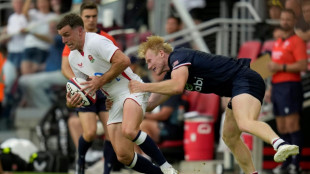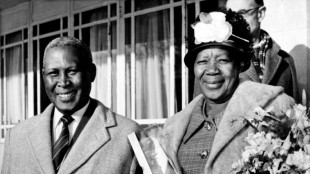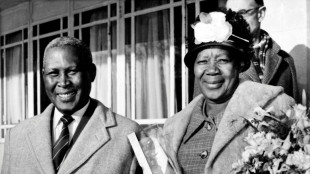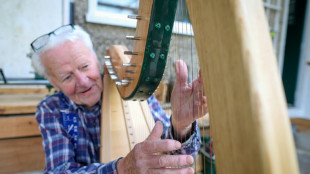
-
 G7 to launch 'alliance' countering China's critical mineral dominance
G7 to launch 'alliance' countering China's critical mineral dominance
-
Wallaby boss Schmidt wary of Ford's 'triple threat'

-
 Swedish hate-crime trial shines light on far-right 'fitness clubs'
Swedish hate-crime trial shines light on far-right 'fitness clubs'
-
Trump call for nuclear tests sows confusion

-
 Chinese EV giant BYD says Q3 profit down 33%
Chinese EV giant BYD says Q3 profit down 33%
-
ECB holds rates steady with eurozone more resilient

-
 Independent Macau media outlet says it will close by December
Independent Macau media outlet says it will close by December
-
Shares in Jeep-maker Stellantis slump despite rising sales

-
 Shelton beats Rublev to reach Paris Masters last eight
Shelton beats Rublev to reach Paris Masters last eight
-
Trump stirs tensions with surprise order to test nuclear weapons

-
 S.Africa court rules ANC leader Luthuli was killed in apartheid 'assault'
S.Africa court rules ANC leader Luthuli was killed in apartheid 'assault'
-
Stocks slide as investors digest Trump-Xi talks, earnings

-
 No GDP data released as US shutdown bites
No GDP data released as US shutdown bites
-
PSG's injured Doue to miss Bayern match, out for several weeks

-
 Litchfield ton guides Australia to 338 in World Cup semis
Litchfield ton guides Australia to 338 in World Cup semis
-
S.Africa court rules ANC leader Luthuli killed in apartheid 'assault'

-
 With inflation under control, ECB holds rates steady again
With inflation under control, ECB holds rates steady again
-
Nigerian designer embraces 'clashes' and 'chaos' at Lagos Fashion Week

-
 Nissan says expects $1.8 bn operational loss in 2025-26
Nissan says expects $1.8 bn operational loss in 2025-26
-
Italy court stalls Sicily bridge, triggers PM fury

-
 Marseille midfielder Nadir stable after on-pitch collapse
Marseille midfielder Nadir stable after on-pitch collapse
-
Saudis turned down Messi stint ahead of 2026 World Cup, says official

-
 Novo Nordisk launches bidding war with Pfizer for obesity drugmaker Metsera
Novo Nordisk launches bidding war with Pfizer for obesity drugmaker Metsera
-
Universal says struck first licensing deal for AI music

-
 France arrests five new suspects over Louvre heist: prosecutor
France arrests five new suspects over Louvre heist: prosecutor
-
Record Vietnam floods kill 10, turn streets into canals

-
 Trump orders US to start nuclear weapons testing
Trump orders US to start nuclear weapons testing
-
'Significant' Xi, Trump talks win cautious optimism in China

-
 French justice minister visits jailed former president Sarkozy
French justice minister visits jailed former president Sarkozy
-
Eurozone growth beats expectations in third quarter

-
 Bali trial begins for 3 accused of Australian's murder
Bali trial begins for 3 accused of Australian's murder
-
Dutch election a photo finish between far-right, centrists

-
 IOC removes Saudi Arabia as host of inaugural Esports Olympics
IOC removes Saudi Arabia as host of inaugural Esports Olympics
-
Russia batters Ukraine energy sites, killing two

-
 Shell's net profit jumps despite lower oil prices
Shell's net profit jumps despite lower oil prices
-
Pakistani security source says Afghanistan talks 'likely' to resume

-
 Fentanyl, beans and Ukraine: takeaways from Trump-Xi's 'great meeting'
Fentanyl, beans and Ukraine: takeaways from Trump-Xi's 'great meeting'
-
Branson's Virgin moves closer to launching Eurostar rival

-
 Russia hits Ukraine energy sites, killing one, wounding children
Russia hits Ukraine energy sites, killing one, wounding children
-
Asia markets fluctuate as investors mull Trump-Xi talks

-
 Trump, Xi ease fight on tariffs, rare earths
Trump, Xi ease fight on tariffs, rare earths
-
Volkswagen posts 1-billion-euro loss on tariffs, Porsche woes

-
 'Fight fire with fire': California mulls skewing electoral map
'Fight fire with fire': California mulls skewing electoral map
-
Fentanyl, beans and Ukraine: Trump hails 'success' in talks with Xi

-
 'Nowhere to sleep': Melissa upends life for Jamaicans
'Nowhere to sleep': Melissa upends life for Jamaicans
-
Irish octogenarian enjoys new lease on life making harps

-
 Tanzania blackout after election chaos, deaths feared
Tanzania blackout after election chaos, deaths feared
-
G7 meets on countering China's critical mineral dominance

-
 Trump hails tariff, rare earth deal with Xi
Trump hails tariff, rare earth deal with Xi
-
Court rules against K-pop group NewJeans in label dispute


Science of sleep: Why a good night's rest gets harder with age
It's well known that getting a good night's sleep becomes more difficult as we age, but the underlying biology for why this happens has remained poorly understood.
A team of US scientists has now identified how the brain circuitry involved in regulating sleepfulness and wakefulness degrades over time in mice, which they say paves the way for better medicines in humans.
"More than half of people 65 and older complain about the quality of sleep," Stanford University professor Luis de Lecea, who co-authored a study about the finding published Thursday in Science, told AFP.
Research has shown that sleep deprivation is linked to an increased risk of multiple poor health outcomes, from hypertension to heart attacks, diabetes, depression and a build up of brain plaque linked to Alzheimer's.
Insomnia is often treated with a class of drugs known as hypnotics, which include Ambien, but these don't work very well in the elderly population.
For the new study, de Lecea and colleagues decided to investigate hypocretins, key brain chemicals that are generated only by a small cluster of neurons in the brain's hypothalamus, a region located between the eyes and ears.
Of the billions of neurons in the brain, only around 50,000 produce hypocretins.
In 1998, de Lecea and other scientists discovered that hypocretins transmit signals that play a vital role in stabilizing wakefulness.
Since many species experience fragmented sleep as they grow old, it's hypothesized that the same mechanisms are at play across mammals, and prior research had shown degradation of hypocretins leads to narcolepsy in humans, dogs and mice.
The team selected young (three to five months) and old mice (18 to 22 months) and used light carried by fibers to stimulate specific neurons. They recorded the results using imaging techniques.
What they found was that the older mice had lost approximately 38 percent of hypocretins compared to younger mice.
They also discovered that the hypocretins that remained in the older mice were more excitable and easily triggered, making the animals more prone to waking up.
This might be because of the deterioration over time of "potassium channels," which are biological on-off switches critical to the functions of many types of cells.
"The neurons tend to be more active and fire more, and if they fire more, you wake up more frequently," said de Lecea.
Identifying the specific pathway responsible for sleep loss could lead to better drugs, argued Laura Jacobson and Daniel Hoyer, of Australia's Florey Institute of Neuroscience and Mental Health, in a related commentary article.
Current treatments, such as hypnotics, "can induce cognitive complaints and falls," and medicines that target the specific channel might work better, they said.
These will need to be tested in clinical trials -- but an existing drug known as retigabine, which is currently used to treat epilepsy and which targets a similar pathway -- could be promising, said de Lecea.
F.Müller--BTB



